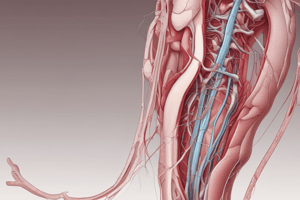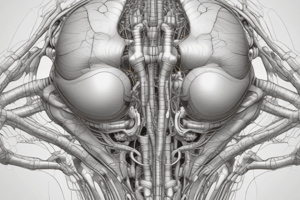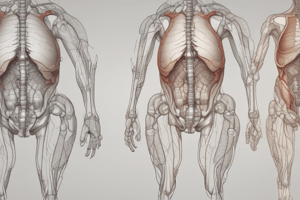Podcast
Questions and Answers
What is the primary artery that supplies the rectum?
What is the primary artery that supplies the rectum?
- Inferior mesenteric artery
- Superior rectal artery (correct)
- Middle rectal artery
- Pudendal artery
The right ovarian vein drains into the left renal vein.
The right ovarian vein drains into the left renal vein.
False (B)
Name the two main terminal branches of the pudendal artery.
Name the two main terminal branches of the pudendal artery.
Inferior rectal artery and perineal artery
The drainage from the rectal plexus is primarily via the ______ rectal veins to the internal pudendal veins.
The drainage from the rectal plexus is primarily via the ______ rectal veins to the internal pudendal veins.
Match the following lymphatic drainage regions with their corresponding nodes:
Match the following lymphatic drainage regions with their corresponding nodes:
Which lymphatic nodes filter drainage from the vulva and perineal regions?
Which lymphatic nodes filter drainage from the vulva and perineal regions?
The thoracic duct transports lymphatic fluid from the subdivision of lumbar lymphatic trunks.
The thoracic duct transports lymphatic fluid from the subdivision of lumbar lymphatic trunks.
What is the role of the inferior rectal artery?
What is the role of the inferior rectal artery?
Which part of the external genitalia is known as a fibrofatty pad covered by hair-bearing skin?
Which part of the external genitalia is known as a fibrofatty pad covered by hair-bearing skin?
The labia minora contains significant amounts of adipose tissue.
The labia minora contains significant amounts of adipose tissue.
What is the primary function of Bartholine's glands?
What is the primary function of Bartholine's glands?
The vagina is a fibromuscular canal that leads from the uterus to the _____.
The vagina is a fibromuscular canal that leads from the uterus to the _____.
Match the following external genitalia parts with their descriptions:
Match the following external genitalia parts with their descriptions:
What are the four fornices of the vagina?
What are the four fornices of the vagina?
The vagina has glands that help keep it moist.
The vagina has glands that help keep it moist.
Which structure ruptures during intercourse and may leave tags known as carunculae myrtifomes?
Which structure ruptures during intercourse and may leave tags known as carunculae myrtifomes?
Which ligaments provide essential support for the uterus and vaginal vault?
Which ligaments provide essential support for the uterus and vaginal vault?
The ovarian artery arises from the common iliac artery.
The ovarian artery arises from the common iliac artery.
What structure lies beneath the bladder providing additional support?
What structure lies beneath the bladder providing additional support?
The _____ ligaments run from the cervix and vaginal vault to the sacrum.
The _____ ligaments run from the cervix and vaginal vault to the sacrum.
Match the following arteries with their primary areas of supply:
Match the following arteries with their primary areas of supply:
What structure forms the upper layer of the urogenital diaphragm?
What structure forms the upper layer of the urogenital diaphragm?
The internal iliac artery divides into anterior and posterior branches, with pelvic organ supplies arising from both.
The internal iliac artery divides into anterior and posterior branches, with pelvic organ supplies arising from both.
What artery is the main blood supply of the uterus?
What artery is the main blood supply of the uterus?
What is the primary function of Doderlein's bacillus in the vagina?
What is the primary function of Doderlein's bacillus in the vagina?
The vagina has a stable pH of 4.5 throughout a woman's life.
The vagina has a stable pH of 4.5 throughout a woman's life.
What three layers make up the uterus?
What three layers make up the uterus?
The section of the uterus that tapers down to the cervix is called the ______.
The section of the uterus that tapers down to the cervix is called the ______.
What is the normal tilt of the uterus referred to?
What is the normal tilt of the uterus referred to?
Match the following parts of the uterus with their descriptions:
Match the following parts of the uterus with their descriptions:
Retroversion and retroflexion of the uterus are considered pathological.
Retroversion and retroflexion of the uterus are considered pathological.
The vagina is protected by maintaining a PH around ______.
The vagina is protected by maintaining a PH around ______.
What is the primary tissue layer that covers the endometrium?
What is the primary tissue layer that covers the endometrium?
The cervix is wider than the uterus.
The cervix is wider than the uterus.
What are the two types of epithelium found in the cervical canal?
What are the two types of epithelium found in the cervical canal?
The fallopian tubes extend from the cornu to the ______.
The fallopian tubes extend from the cornu to the ______.
Which part of the fallopian tube is the widest and longest?
Which part of the fallopian tube is the widest and longest?
The transformation zone of the cervix is where columnar epithelium transitions to ciliated epithelium.
The transformation zone of the cervix is where columnar epithelium transitions to ciliated epithelium.
How long is the cervix typically?
How long is the cervix typically?
Match the following parts of the fallopian tubes to their descriptions:
Match the following parts of the fallopian tubes to their descriptions:
Flashcards are hidden until you start studying
Study Notes
Vascular Anatomy of the Pelvis
- The pudendal artery exits the pelvic cavity via the sciatic foramen, supplying inferior rectal, perineal, and vulval arteries.
- The superior rectal artery continues from the inferior mesenteric artery, descending in the mesocolon and branching to supply the rectum.
- Pelvic veins drain the uterine, vaginal, and vesical plexuses into internal iliac veins; rectal plexus drains via superior rectal veins to inferior mesenteric veins, and middle/inferior rectal veins to internal pudendal then to iliac veins.
- Ovarian veins arise from the pampiniform plexus; the right ovarian vein drains into the inferior vena cava, while the left drains into the left renal vein.
- Lymphatic drainage from lower extremities, vulva, and perineal regions is through inguinal and superficial femoral nodes, then to external iliac, common iliac, and para-aortic nodes.
Anatomy of the External Genitalia
- The vulva includes mons pubis, labia majora, labia minora, vaginal vestibule, clitoris, and greater vestibular glands.
- Mons pubis: a fibrofatty pad covered with hair.
- Labia majora: skin folds containing sebaceous and sweat glands, positioned alongside the vaginal opening.
- Labia minora: thinner skin folds between labia majora, containing sebaceous glands but no adipose tissue.
- Clitoris: a small erectile structure (0.5-3.5 cm) composed of corpora cavernosa.
- Vaginal vestibule: contains openings for the urethra, Bartholin’s glands, and vagina.
- Bartholin’s glands: bilateral glands contributing to lubrication during intercourse, opening via ducts into the vestibule.
- The hymen: a mucous membrane covering the vaginal entrance, typically perforated during menstruation and may rupture during intercourse.
Internal Reproductive Organs
- The vagina is a fibromuscular canal (9cm posteriorly, 7cm anteriorly) lined with stratified squamous epithelium; its moisture is maintained by secretions from uterine and cervical glands.
- Pelvic fascia includes parietal and visceral layers, supporting pelvic organs and providing attachment points for key ligaments.
- Cardinal ligaments support the uterus and vaginal vault, while utero-sacral ligaments extend to the sacrum.
Uterus Anatomy
- The uterus is an inverted pear-shaped organ measuring 7.5 cm in length, with a tapered cervix projecting into the vagina.
- Divided into three main layers: serous layer (peritoneum), muscular layer (myometrium), and mucous layer (endometrium).
- The endometrium undergoes cyclical changes during menstruation, with thickness varying from 1-5 mm.
Cervix and Fallopian Tubes
- The cervix: about 2.5 cm long, surrounded by parametrium, has glandular follicles secretive of alkaline mucous; transition from columnar to stratified squamous epithelium at the external os known as the transformation zone.
- Fallopian tubes extend from the uterus to ovaries, covering 10 cm in length; they consist of four parts: interstitial, isthmus, ampulla, and fimbrial portion, with a ciliated epithelium and muscle layers.
Summary of Key Physiological Changes
- At puberty, the vulva develops hair and fat deposits; after menopause, the labia minora thins.
- The vagina's epithelium is rich in glycogen during the post-ovulatory phase, and its pH ranges around 4.5 due to Doderlein’s bacillus.
- Hypertrophy of the vagina occurs at birth and at puberty but atrophies post-menopause.
Studying That Suits You
Use AI to generate personalized quizzes and flashcards to suit your learning preferences.




